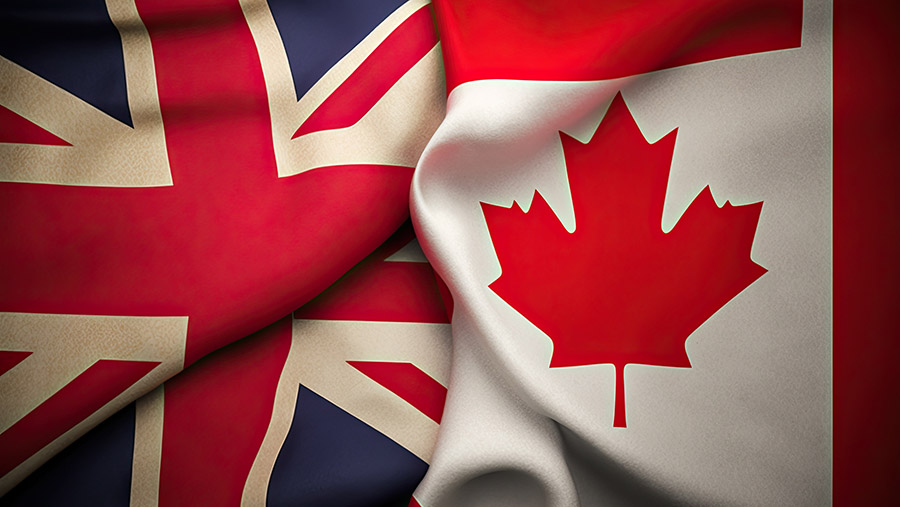Farmer relief as UK/Canada free-trade talks suspended
 © JJAVA-Adobe-Stock
© JJAVA-Adobe-Stock Farm leaders have expressed their relief at the sudden collapse of free-trade talks between the UK and Canada, describing it as “the right decision”.
News of the breakdown emerged on Thursday night (25 January), following disagreement over the tariffs being imposed on UK cheese exports, and UK resistance to importing Canadian beef treated with hormones.
See also: Australian trade deal – opportunities and threats
Talks between the two countries have been ongoing for almost two years, with trade carrying on more or less as it was before Brexit.
Cheese in particular was still able to access the Canadian market at zero-tariff levels. But that deal expired at the end of December, and since then, UK cheese exports have been liable to tariffs of 245% or more.
The Canadian government had been facing considerable pressure from the country’s dairy sector not to give too much away during the course of negotiations, while its cattle farmers wanted greater access for their hormone-treated beef.
‘Going nowhere’
With the talks seemingly going nowhere, the British government announced on Thursday evening (25 January) that it was suspending negotiations.
A UK government spokesperson said: “We have always said we will only negotiate trade deals that deliver for the British people. And we reserve the right to pause negotiations with any country if progress is not being made.”
NFU president Minette Batters welcomed the outcome. “On products such as beef and cheese, Canada was demanding too much and offering too little,” she said.
“We understand that Canada made repeated attempts to force the UK to change its food safety rules and to extract unreasonable concessions for maintaining our preferential access to its cheese market beyond the end of 2023.”
Mrs Batters applauded the apparent commitment by the UK government not to lower the UK’s high standards of food safety in its quest for a trade deal.
Country Land and Business Association president Victoria Vyvyan agreed that allowing imports of hormone-treated beef from Canada would be “too big a price to pay”.
“British farmers rear cattle to the very highest animal welfare and environmental standards,” she said. “It would be an unfair market for British farmers if they have to compete with imported meat produced to lower and cheaper standards than would be legal here.”
Difficult
However, UK cheese exporters have been alarmed at the change of tack, which means their product is going to find it increasingly difficult to access the Canadian market.
Helen Dallimore of Wiltshire-based Coombe Castle International, which earns about one-third of its income from exports to Canada, said the loss of tariff-free quota had caused serious problems.
Its importing partners in Canada now had to find spare “non-EU quota” to be able to ship cheese without tariffs. But with just 6,000t of this available, compared with 14,000t of “EU quota” each year, this was very hard to come by.
“The breakdown of trade talks is a real concern,” said Ms Dallimore. “We were expecting an update next week from the Department for Business and Trade on how negotiations were progressing to secure more quota.
“But this is now seemingly off. It puts us in a very difficult position.”
Last year, the UK exported £198m worth of food to Canada, with cheese being one of the top products.
UK/Canada cheese trade
The terms of trade between Canada and the UK will now continue on the basis of the UK-Canada Trade Continuity Agreement (TCA), which entered into force on 1 April 2021.
Within that agreement there was a “sunset clause” relating to the UK’s access to Canada’s cheese quota, which expired on 31 December 2023.
As of 1 January 2024, the UK’s preferential access to Canada’s cheese market was moved out of the quota reserved for “EU use”, and into the “non-EU sources reserve”.
This is a much smaller quota, which is routinely filled to capacity and means the UK will be competing against many more global exporters for space.
It also means Canadian importers who want to import UK cheeses will have to hold the correct licence, which may not be the case if they were importing the cheese previously via the EU reserve.
Without access to the preferential quota, the duty on imported cheese to Canada is prohibitively high at 245% of the value of the product, meaning that it will no longer be price competitive in the market.
Source: NFU
